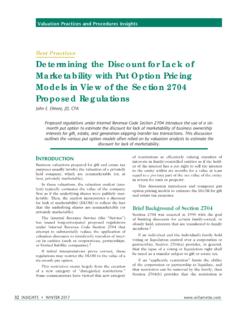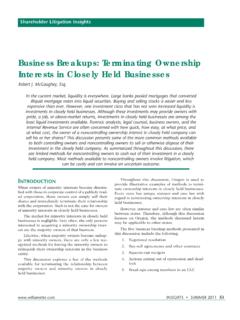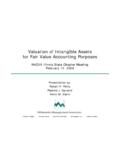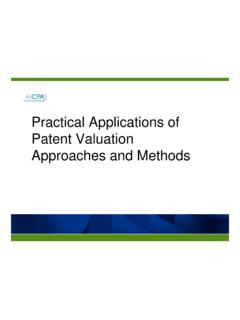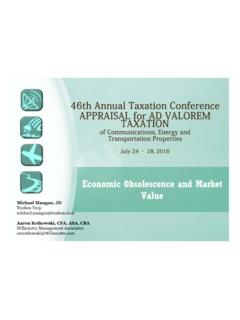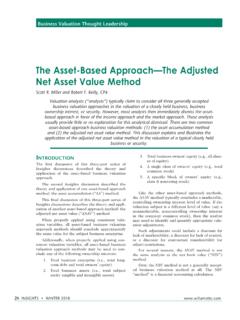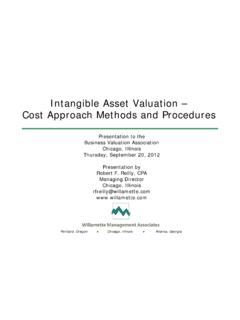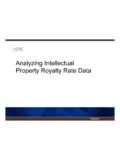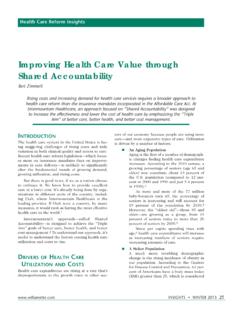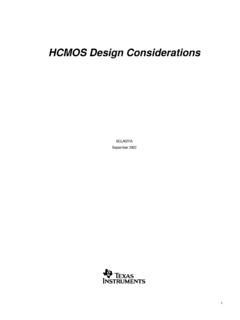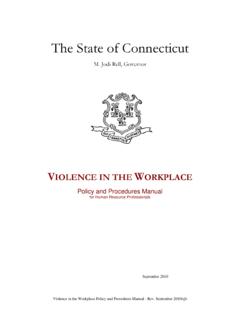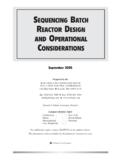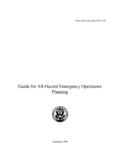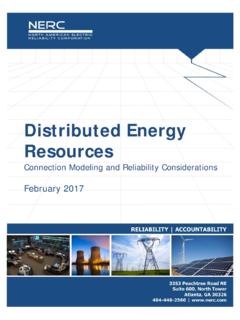Transcription of Considerations in Forensic Royalty Audit Engagements
1 66 INSIGHTS SPRING 2016 www .willamette .comConsiderations in Forensic Royalty Audit EngagementsNatasha PerssicoForensic Analysis InsightsLicenses are becoming an increasingly common means for intellectual property owners to reap some benefit from their inventions without having to manufacture a product or employ a process themselves. Therefore, the Royalty Audit is an important tool for licensors who want to successfully manage their intellectual property. This procedure serves to ensure that the licensor receives the agreed upon level of benefits (in the form of Royalty payments) as outlined in the licensing agreement. Licensing agreements can be inherently complex contracts. Further, evidence from Royalty audits shows that licensees perform very poorly in self-reporting royalties. When the potential for litigation or disputes over Royalty amounts is possible, the Royalty Audit should be conducted by a Forensic analyst who is experienced in reviewing and analyzing complex financial of intellectual property (IP) will often license IP to a third party in exchange for payments based on usage (usually referred to as royalties).
2 Licenses serve to capture the full market value of IP by providing the IP owner with the means to ben-efit from the IP without having to singularly expend all efforts towards manufacturing and marketing the products associated with the IP. Using different forms of licenses, the owner of the IP can engage in distribution and marketing of the invention by imposing appropriate terms and conditions of sale, use, and further development of the licensee is beholden to the binding contractual obligations within a license agreement. However, a core issue with licensing agreements is that most of these agreements rely upon the licensee to self-report In underrePorted royaltIes by lIcenseesLicensee self-reporting presents a unique issue in that licensees appear prone to misinterpreting the con-tractual language in the license agreement, thereby leading to underreported royalties.
3 Numerous reports on the findings of Royalty audits reveal that the under-reporting of royalties is a commonplace to one Royalty compliance report published in 2013, whether due to intentional or unintentional causes, up to 89 percent of audited licensees underreport and underpay For contract noncomPlIanceMany reasons exist for contract noncompliance, ranging from instances of fraud to simple adminis-trative errors in aggregating data or errors in per-forming of the more common reasons for noncompliance with licensing agreements include the following:n Intentional fraud or reckless misinterpreta-tions of the contractual agreementn Sales or transfers by the licensee to related parties in transactions that do not reflect arm s-length pricingwww .willamette .com INSIGHTS SPRING 2016 67n Unintentional mistakes in interpreting the license agreementn Intentional or unintentional omission of new, updated, or changed productsn Inappropriate or noncontractual deductions in the calculation of net salesn Application of rebates, discounts, or other sales incentives to licensed products in a manner that underreports license-related salesn Inappropriate attribution of value to licensed products on bundled product salesAccording to the Invotex study, the frequency rate of common underreporting errors are as follows.
4 N 55 percent of licensees underreport salesn 38 percent misinterpreted the licensing agreementn 28 percent overstated deductionsn 15 percent made calculation errorsn 8 percent misapplied Royalty ratesn 7 percent underreported sublicensesn 5 percent applied improper transfer pricingn 3 percent underreported ,4beneFI ts oF the Forensic Royalty audItThe most obvious benefit of the Royalty Audit is the recovery of Royalty underpayments. Evidence from findings of Royalty audits conducted by auditors and Royalty compliance investigation professionals suggest that Royalty recoveries are within the mag-nitude of 5 to 20 times the cost of conducting the Royalty addition to the recovery of Royalty amounts due to discoveries made during the actual conduct of the Royalty Audit , evidence from certain Royalty Audit case studies suggests that licensees will often report a self-corrected Royalty amount from a self-conducted Audit once they are informed that a roy-alty Audit will take , the Royalty Audit has the potential to reveal the unauthorized use of licensed property.
5 The unauthorized use of licensed property could be a troublesome circumstance for the licensor, result-ing in possible damage to the licensor s reputation or creating legal regular Royalty audits typically has the effect of deterring inappropriate reporting of Royalty amounts by licensees. Regardless of whether the underreported Royalty amounts result from intentional or unintentional means, the Royalty Audit serves as a powerful tool that the licensor should utilize on a regular a Royalty underpayment issue does exist, it is in the licensor s best interest to discover the prob-lem before the expiration of any statutes of limita-tions. Otherwise, depending on the state in which the suit is brought forth, recovery of the underpay-ments may become example, in Shell Oil Co.
6 V. Ross, Shell entered into a mineral lease with the Ross family in 1961. Under the terms of the lease, Shell was obli-gated to pay the Rosses a Royalty equal to 1/8 of the amount realized from the sale of any gas produced from the land. Shell did not consistently calculate the 1/8 interest based on the third-party gas sale Ross family sued over these discrepancies in 2002, which was outside the Texas four-year statute of limitations for a contract claim. But, plaintiffs argued that the claims were not barred because of the fraudulent concealment doctrine, which tolls limitations when a person attempts to conceal his wrongdoing until the risk period is argued that Shell had concealed the fact that it was underpaying the royalties because Shell s Royalty statements did not reflect the amount that Shell was actually receiving from the third-party gas trial court ruled that Shell breached the lease by paying royalties to the Ross family based on a weighted average between 1988 and 1994 instead of the actual prices for that time period.
7 The jury agreed with the plaintiffs and awarded damages to the Ross , the Texas Supreme Court reversed. The court acknowledged that the Royalty state-ments did not reveal that the Ross family was being underpaid. However, the court s position is that the Ross family had a duty to investigate the Royalty statement, and make themselves aware of relevant information available in the public record. 8In other words, the Ross family had the ability and duty to conduct a Royalty should also take care to stay apprised of how the changing technological and business environment affects the amount of royalties that are due for their intellectual property. In the music industry, recent court cases and settlements point to an apparent consensus that digital music sales should be treated as licenses instead of as sales, with the former yielding a substantially higher Royalty 2014, Warner Music Group Corp.
8 Agreed to pay upwards of $ million and increase the percentage paid for royalties going forward for digitally downloaded music, which will now be treated as a license, instead of the lower Royalty 68 INSIGHTS SPRING 2016 www .willamette .comyielding category of In 2015, Universal Music agreed to a similar settlement of a class action issue of whether digitally downed music should be classified as a license or as a sale was first presented on a large scale in the landmark case Productions v. Aftermath. Plaintiffs for the case argued that digitally downloaded Eminem songs should be treated as licenses instead of sales since Productions was not incurring expenses to package and sale any physical Is a Forensic Royalty Audit and who should conduct the InvestIgatIon?
9 A Royalty Audit is an analysis or investigation of a licensee s compliance with the contractual license agreement. Financial compliance is gener-ally determined through an examination of the accounting books and records of the licensee and its from Royalty Audit Engagements sug-gests a significantly high level of Royalty contract noncompliance on the part of the licensee. Licensees are inclined to underreport Royalty amounts via a myriad of , experienced Forensic accountants and other Forensic investigation professionals are typi-cally better suited to successfully conduct Royalty Audit functions involving any schemes or mecha-nisms to obfuscate correct Royalty amounts , when legal disputes do arise, Forensic professionals, who have skills tailored to detecting fraud or misrepresentation, often are best-suited to conducting Royalty audits and communicating those findings to a court or in have historically been criticized for employing a check-the-box mentality when con-ducting auditing procedures.
10 Audit regulators have been lobbying for increased use of professional judg-ment in the Audit of complex financial statement , auditors seem to interpret Audit stan-dards as increasingly Forensic pro-fessionals are arguably less inclined to employ a mechanical or check-the-box Audit approach to deci-sions in those situations in which it is most important to make decisions based on professional the services of an experienced Forensic accountant with Royalty Audit experience is espe-cially judicious when there is a possibility of con-tentious disagreement and litigation associated with the Royalty oF data analytIcs In Forensic Royalty audItsThe volume of data and electronic information has increased substantially over the last few years. This increase is changing the way companies manage and extract value from , it is imperative that the Royalty Audit team has extensive experience in dealing with com-plex and massive data sets within the context of cor-porate disputes.
